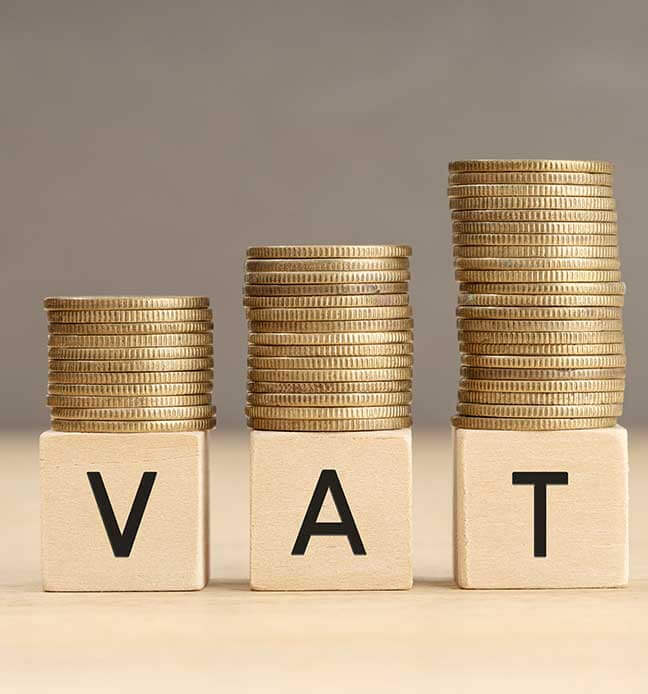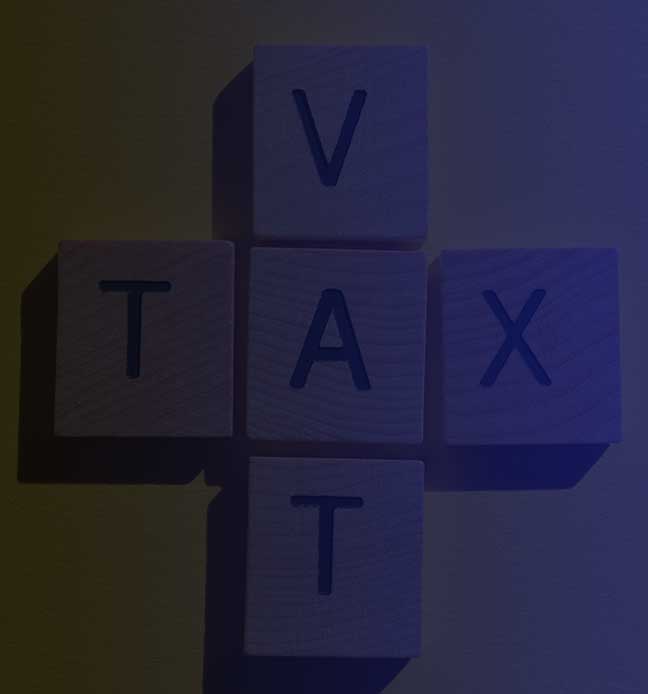VAT Registration Services in Dubai, UAE
VAT (Value added TAX), a secondary tax levied on the consumption of goods and services, has been adopted by many global governments to create one more gateway for revenue generation.
10+
Years Of
Experience

Audit Completed

Experts

Government Agencies We Are Affiliated With




VAT Consultancy Services in Dubai
The UAE offers several tax-free business zones that make it attractive for foreign investors and budding businesses from across the world. VAT is government recognized and having a business registered under the VAT law carries a lot of weight. Having realized the value of VAT, the GCC countries have recently registered themselves under VAT law and made it effective from 1st Jan 2018 with 0% to 5% as the VAT rate.
The UAE government has made VAT a prerequisite for the establishment of any business in Dubai, whether small, medium, or large. However, certain conditions apply and the VAT registration in Dubai includes a few important and tedious measures.

VAT registration in Dubai
Registration of business entities for VAT depends on the income generated by the business. The following table shows entities that need a VAT registration in Dubai:
Vat Registration Process In Uae
To register in FTA (Federal Tax Authority) for VAT, a person must fill the VAT Registration form online and submit the same to the authority along with necessary supporting documents.
Vat Group Registration
VAT Group Registration is a tax registration process where two or more business parties club together to form a group, intending to pay a single tax. By registering under the Group VAT scheme, the businesses under consideration get a single VAT number and can file a single return.
Prerequisites Need To Be Fulfilled
- Each party should have a “place of establishment” or a “fixed establishment” in the UAE
- The concerned parties should be related at economic, financial, or regulatory levels.
- One or more persons conducting business in the VAT group shall control the others.
Vat Record Keeping
Maintaining VAT records is done for tracking up-to-date information regarding VAT filing, and to avoid unnecessary tax payment. Any company registered under VAT Law must maintain its book of records for a minimum period of 5 years. The core essentials of this book include:
Avyanco VAT Registration Services In Dubai
Avyanco has been instrumental in handling accounting and taxation services for many business entities; start-ups and established companies. Understanding the importance and need for VAT Services in Dubai for new and existing business entities, we deliver a wide range of VAT services as listed here:

Mandated to apply for
VAT Registration
Lorem Ipsum is simply dummy text of the printing and typesetting industry. Lorem Ipsum has been the industry’s standard dummy text ever since the 1500s, when an unknown printer took a galley oftype and scrambled it to make a type specimen book.
Learn More

Can voluntarily apply for
VAT Registration
Companies having taxable supplies and services or imports between AED 187,500 and 375,000
Learn More

Not required to Apply for
VAT Registration
Companies having taxable supplies and imports less than AED 187,500
Learn More

Why VAT Registration in Dubai is Important?
Why Vat Registration In Dubai Is Of Prime Importance To Any Business Setup In Dubai, UAE:
- Worldwide authentication of the company registration.
- It boosts the business profile
- One may claim for VAT refunds
- It helps to grab a mass market
Why Avyanco for VAT Services in Dubai?
Avyanco, since its inception, has shown finesses as a business consultant and dealt with accounting and taxation services in Dubai with utmost accuracy for various clients renowned worldwide. Our VAT veterans assist you to file the beneficial VAT process and lessen the cash flow during tax payments. We deliver a wide range of VAT services as listed here
- VAT registration and VAT Group registration
- VAT compliance and control
- VAT filing and payment
Still Confused about taking your decision?
-
Expertise
Avyanco's VAT expertise guides clients confidently through the UAE's tax maze.
-
Comprehensive Services
Avyanco's full VAT range streamlines the process for clients.
-
Client-Centric Approach
Avyanco customized strategies for client-specific VAT needs.
Meet Our Specialists

Ravi

Mansur

Himanshu

Himanshu
Join 2000 Happy Customers
VAT = Value Added Tax levied on the consumption or use of goods and services at each point of sale. It is in existence in more than 180 countries around the world. The end-consumer ultimately bears the cost.
In-order to obtain VAT Certificate from the Federal Tax Authority the applicant must consider various aspects such as, whether to register as
- Voluntary Applicant
- Mandatory Registrant
- Tax Group
- Standalone
VAT Certificate is a Statutory Document issued by the Federal tax Authority confirming the registration of the applicant mentioning the Tax Registration Number (TRN) & the period for which the Tax Returns need to be filed.
In terms of Standard Rated Supplies, the Percentage of VAT is 5%. However, there are Exempt & Zero-Rated Supplies as well.
Once the Tax Period & the frequency of filing i.e. whether Monthly or Quarterly is defined in the Tax Certificate then accordingly the company has to file its tax returns on the 28th of the month following the end of the tax period.
Penalty in-case of failure of the registrant to submit a tax return within the timeframe specified by the tax law. 1,000 for the first time. 2,000 in case of repetition within 24 months.



